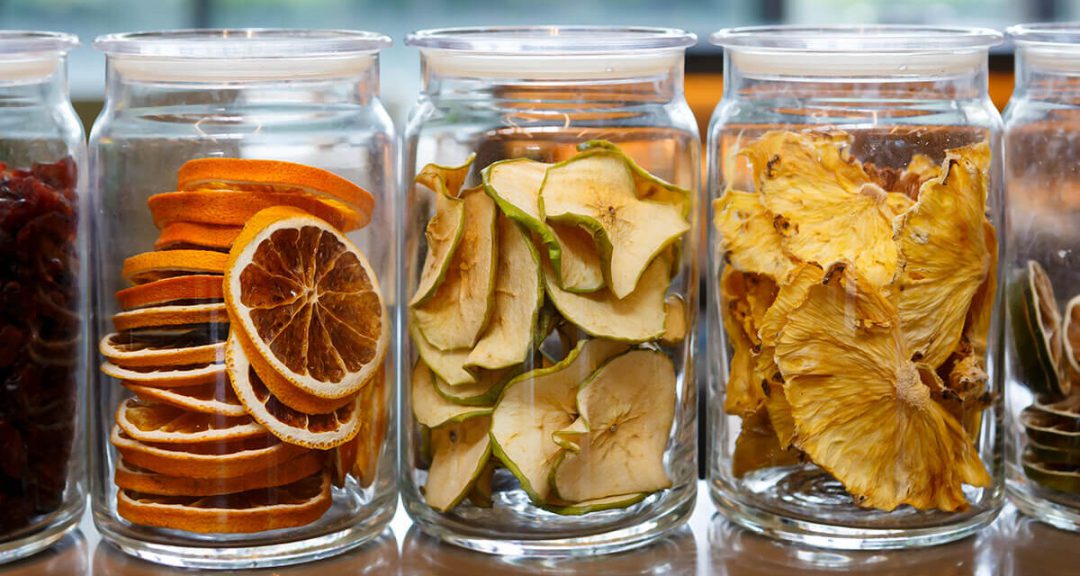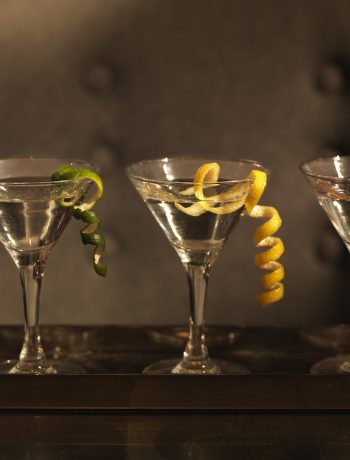No… I’m not talking about the “cotton mouth” feeling you get after a night of overindulging. I’m talking about dehydrated fruits and herbs to infuse liquors or garnish cocktails.
Last fall we traveled to The Cadilac Hotel and Beach Club in Miami, Florida. While enjoying a cocktail at the Lobby Bar, my wife and I noticed a number of crystal decanters on the bar. The bartender told us the staff spends a good deal of time infusing liquors with assorted fruits, spices, and herbs. Orange and allspice-infused whiskey, all sorts of dehydrated tropical fruits in vodka, and a botanical assortment infused in their gin caught our attention. While we weren’t there long enough to try them all, we were intrigued enough to buy a food dehydrator!
So what is a food dehydrator?
A food dehydrator is a kitchen appliance that removes moisture from foods to preserve them. It works by circulating warm air around the food, which causes the moisture to evaporate. This process can extend the shelf life of foods and create unique textures and flavors.
Food dehydrators usually consist of a box or container with trays or shelves for placing the food. The box has a heating element and a fan to circulate the warm air. Some models have adjustable temperature and timer settings, while others may have preset programs for different types of foods.
Dehydrators can be used to preserve a wide range of foods, including fruits, vegetables, meats, herbs, and spices. Dehydrated foods can be stored for long periods of time without refrigeration, making them convenient and portable snack or ingredient.
Overall, a food dehydrator can be a useful tool for home cooks and professional chefs alike, allowing them to preserve and create unique and flavorful foods.
Does my home bar need a food dehydrator?
While not every bar necessarily needs a dehydrator, having one can be a useful tool for many reasons. Here are some potential benefits:
Unique menu items: A dehydrator can be used to create unique and interesting menu items that set a bar apart from its competition. For example, you could create dehydrated fruit garnishes for cocktails or use the dehydrator to make your own beef jerky.
Cost savings: Dehydrating ingredients can help reduce waste and save money. By dehydrating fruits, vegetables, and meats, bars can extend the shelf life of these items and use them in multiple menu items.
Healthier options: Dehydrating fruits and vegetables can preserve their nutritional value while removing excess moisture. This makes them healthier snack options for customers who are looking for healthier alternatives.
Efficient storage: Dehydrated ingredients take up less space than fresh ingredients, making them easier to store in a bar’s kitchen. This can be especially helpful for smaller bars with limited storage space.
Sustainable practices: Dehydrating ingredients can be a sustainable practice because it reduces the need for refrigeration and can help reduce food waste.
Overall, while not essential, a dehydrator can be a useful tool for bars looking to create unique menu items, save money, offer healthier options, efficiently store ingredients, and practice sustainable habits.
What cocktails can I make with dehydrated fruit?
Dehydrated fruit can add a delicious and unique flavor to cocktails. Here are a few cocktail recipes that incorporate dehydrated fruit:
Dehydrated Strawberry Margarita
- 2 oz tequila
- 1 oz lime juice
- 1 oz triple sec
- 1/2 oz agave syrup
- 3 dehydrated strawberries
- Salt for rimming (optional)
Instructions: Muddle the dehydrated strawberries in a shaker. Add ice, tequila, lime juice, triple sec, and agave syrup. Shake well and strain into a glass with or without a salt rim. Garnish with a dehydrated strawberry.
Dehydrated Peach Old Fashioned
- 2 oz bourbon
- 1/2 oz peach liqueur
- 1 tsp simple syrup
- 2 dashes of bitters
- 1 dehydrated peach slice
Instructions: In a mixing glass, add the dehydrated peach slice, bourbon, peach liqueur, simple syrup, and bitters. Muddle the peach slice and stir the mixture. Strain into a glass with ice and garnish with a dehydrated peach slice.
Dehydrated Pineapple Coconut Mojito
- 2 oz white rum
- 1 oz coconut water
- 1 oz lime juice
- 1 oz simple syrup
- 5-6 mint leaves
- 3 dehydrated pineapple rings
Instructions: In a shaker, muddle the dehydrated pineapple rings and mint leaves. Add ice, rum, coconut water, lime juice, and simple syrup. Shake well and strain into a glass with ice. Garnish with a dehydrated pineapple ring and a mint sprig.
Note: You can also use other types of dehydrated fruit, such as mango, apple, or banana, to create unique and flavorful cocktails.





No Comments